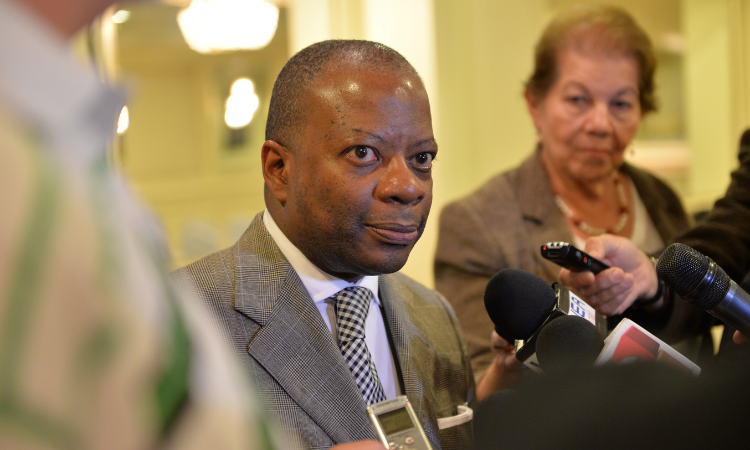The US State Department (DOS) is being exposed by Guatemalan officials as criminal and working against US interests. DOS is frantically covering its tracks and protecting its allies.
The criminal DOS nexus entangles UN officials, the Colombian president, and fugitives from Guatemala. Although united on their socialist agenda, the nexus participants fear division as their crimes become harder to obfuscate.
Why This Matters to Colombia
The centerpiece of the nexus is Iván Velásquez, the Colombian defense minister who led a UN-created anti-impunity commission in Guatemala (CICIG). He and his coconspirators, who had US funding and DOS backing, face criminal charges announced on January 16: obstruction of justice, conspiracy, and abuse of authority regarding Guatemala’s case against Odebrecht.
The case also snares Colombia’s ex-guerrilla president, Gustavo Petro, because he wants Velásquez at his side with his socialist agenda, which is bringing Colombia and the Chavista dictatorship in Venezuela closer together. Petro just told the World Economic Forum that humanity must overcome capitalism.
Colombia Senator María Fernanda Cabal says “Iván Velásquez is critical to Petro’s agenda of creating chaos and undermining our laws and Constitution. He has been weakening our security forces and helping to execute Petro’s Total Peace plan that will give 22 groups impunity for past actions, including narcotraffickers such as the FARC.”
Petro told an assembly of coca producers they “can continue growing coca while experimenting with substitutes.” Petro had a January 8 love fest of talks with Nicolas Maduro, who has a $15 million US bounty on him for narcotrafficking, upon which his regime depends.
Department of State Projects Its Criminality
The prosecutor, Rafael Curruchiche, has explained that those charged in the Odebrecht case conspired to release Odebrecht officials from Guatemala’s $384 million claim against the company. The Guatemalan judiciary in 2022, however, determined the release was illegal and annulled it.
Velásquez appears to have conspired with five people, including two former prosecutors joined at the hip with DOS. The US department has openly praised and formally honored these two individuals because they were DOS agents carrying out a socialist agenda.
Assistant Secretary of State for Western Hemisphere Affairs Brian Nichols tweeted his opposition to the “arrest warrants against individuals who worked to ensure accountability for corruption in the Odebrecht case in Guatemala.” The implication from Nichols is that the warrants are politically motivated—as the pot calls the kettle black. Curruchiche has provided evidence, including copies of communications among the accused.
Petro immediately stated: “I will never accept an arrest warrant for our minister Velásquez. He demonstrated fighting against corruption, and we will not permit corruption against him. We immediately recall our ambassador [to Guatemala].” Petro lost the plot and also called Guatemala genocidal.
Guatemala’s President Alejandro Giammattei replied, “I will let President Petro continue committing a guerrilla’s mistake. It is not good politics.”
Petro also said, “The investigation against Iván Velásquez is perverse.” Petro cited DOS sanctions against Curruchiche for “obstructing investigations into corruption … and raising apparently spurious claims against prosecutors, private attorneys, and former CICIG prosecutors.”
How the CICIG, US Embassy Flipped “Anti-Impunity”
Velásquez was commissioner of the perverted CICIG from 2014 to 2019, and Todd Robinson was US ambassador to Guatemala from 2014 to 2017. Robinson ruled Guatemala as proconsul and used the CICIG to target political opponents and protect allies regardless of law. Neither man wants the world to scrutinize what he did in Guatemala.
When questioned about violating international law, Robinson famously told the press in 2016: “Sovereignty comes last.” After Robinson intimidated Guatemala’s Congress into appointing his choice for high-court magistrate, the president of the Congress was caught on tape saying the US ambassador gave him direct orders.
The CICIG routinely violated the law, as documented by a detailed report from the nonprofit Association Liga Pro-Patria. The CICIG became what it was created to eliminate: a security group above the law that violated the fundamental rights of Guatemalans.
The US Helsinki Commission confirmed this when it exposed CICIG collusion for Russian dictator Vladimir Putin’s henchmen as they persecuted the Bitkov family in Guatemala. Even the United Nations hid CICIG criminality: Secretary General Antonio Guterres violated international law by refusing to appoint a new commissioner, even though Velásquez was barred from Guatemala.
The Noise That Hides the Signal
Guterres’s spokesman gave a hypocritical statement on January 18 that condemned Guatemala’s legal action, even though it is justified with clear evidence. Petro cited the statement and echoed the view that Velásquez had diplomatic immunity. In other words, they cannot refute the guilt of Velásquez and his DOS-backed conspirators.
Regarding diplomatic immunity, former Guatemalan constitutional law professor José Luis González clarifies why that does not apply: “The agreement and the Vienna Convention on Diplomatic Relations clearly hold that diplomatic immunity only applies to official and not to personal actions. The charges against Velásquez regarding the Odebrecht case are clearly outside CICIG official duties, making Velásquez subject to criminal prosecution.”
DOS, Petro, and Guterres are desperate to quash the Velásquez prosecution because it is exposing their crimes and impeding their totalitarian, Chavista-style agendas. Robinson is assistant secretary of state for international narcotics and law enforcement, but he is inseparable from Velásquez, a friend of Colombia’s and Venezuela’s narcos. That makes Robinson unqualified to the role, and the Odebrecht case leads to how he conspired with Velásquez to impose socialism on Guatemala.
Read the original on BizPac Review.
 Join us in our mission to foster positive relations between the United States and Latin America through independent journalism.
Join us in our mission to foster positive relations between the United States and Latin America through independent journalism.
As we improve our quality and deepen our coverage, we wish to make the Impunity Observer financially sustainable and reader-oriented. In return, we ask that you show your support in the form of subscriptions.
Non-subscribers can read up to six articles per month. Subscribe here.

